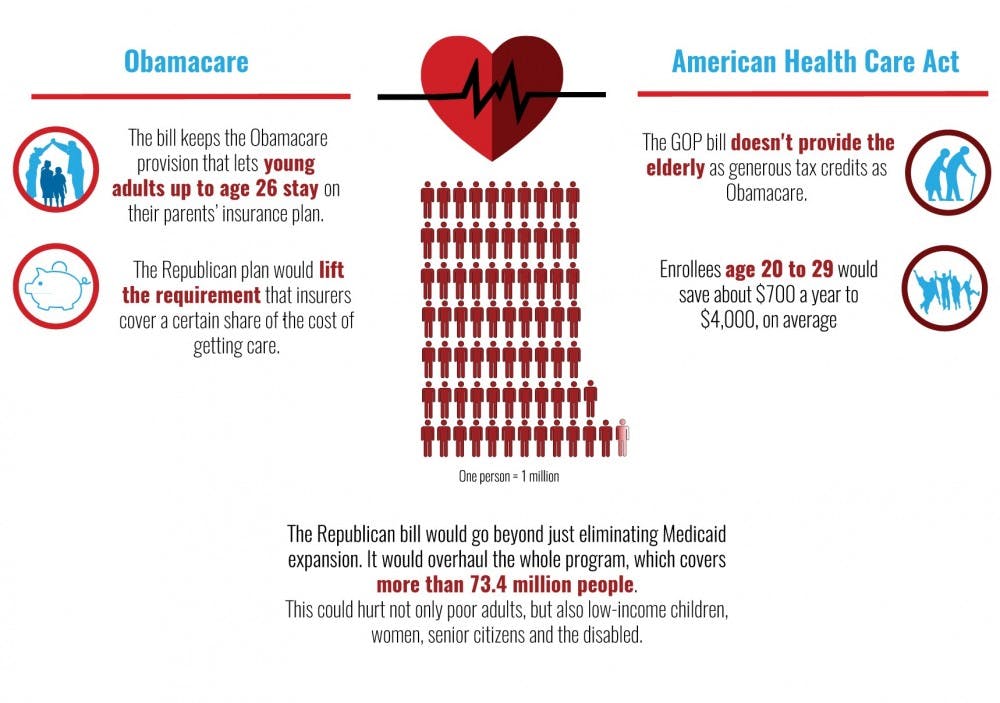Republicans in Congress have made the first steps to repeal the Affordable Care Act (ACA), an action which will leave millions of Americans without health insurance.
The ACA, also known as Obamacare, requires Americans whose jobs do not provide healthcare to purchase healthcare from private insurers — the government provides an online marketplace to do so. Its initiative is to provide an affordable means of healthcare by including younger people in the medical system.
The ACA also includes provisions such as allowing children to stay on their parents’ plans until they are 26-years-old. So far, the GOP’s new bills do not detail repealing this part of the ACA, which means that Elon University students will have the ability to remain on their parents’ plans through the repeal.
But college students under their parents who purchased plans through the ACA may change.
“People who buy insurance under Obamacare — their plans will certainly change,” said Carrie Eaves, assistant professor of political science and policy studies at Elon.
As to how these plans will change is still unclear.
“It’s all sort of a giant question mark,” Eaves said.
Jana Lynn Patterson, dean of student health and wellness said even minute, day-to-day situations may become more complicated for college students.
“Little things like flu shots — right now a student can go to CVS, show their Phoenix card and get a flu shot. Now they may have to pay for that,” Patterson said
Eaves added that the plan may change because it's still in its early stages.
“A lot of it is still unknown," Eaves said. The bill is a starting point and can be changed.”
A lot of changes could be coming.
“It discourages students who may need to seek treatment for a variety of psychological and emotional issues," Patterson said. "I saw a change in parents’ willingness to take a student home to seek treatment.That will have a profound effect.”
The pre-existing condition clause of the ACA states that a patient cannot be charged more or turned away from healthcare based on prior or present health status.
“If the pre-existing clause is repealed, students who may have had the onset of a life altering condition, and get a job after school, their new insurer may not cover them for that,” Patterson said. “Young people move jobs a lot. If you move from one job to another, and you’ve had a pre-existing condition, your new insurance company wouldn’t cover that.”
The bills proposed by Republicans outline what they plan to replace the ACA with. The new plan removes the mandate that all Americans are required to have health insurance and instead focuses on the financial aspect.
“The way insurance is subsidized for low income individuals will change," Eaves said. "Poorer people will not be able to afford it anymore. 20 million americans may not be able to afford healthcare."
According to a Kaiser Study, low-income Americans — ones with an income of around $20,000 — would be most affected. A 27-year old will receive $2,000 instead of $3,225 under the ACA. A 40-year old will get $3,000 instead of $4,150. A 60-year-old will receive $4,000 instead of $9,900.
“Tax benefits for the wealthy will still be covered," Eaves said. "Those are the people that will benefit the most."
The new policy is wrought in controversy. For many Republicans, the goal is to eradicate the ACA completely.
“You can’t just remove everything tomorrow,” Patterson said.
Eaves also said that while many Republicans wanted to repeal the ACA for almost eight years, the process may be harder and more complex than they thought.
“Many conservatives believe that it does not go far enough," Eaves said. "It is not as dramatic a reversal as some Republicans wanted. But Obamacare is so entrenched now, it is hard to reverse."
In order to prepare for any possible change, Elon students should remain updated with the case as much as possible.
“Stay aware, knowledgeable on how it will affect you and others," Eaves said. "Stay as educated as possible for what these policies mean going forward.”
“As far as preparing, I recommend doing things while the ACA is in place, like scheduling annual exams with your care provider and making sure your immunizations are up to date,” Patterson said.
There are also ways for students to take action against the changing policies.
“Don’t panic just yet," Eaves said. "Now is the time to call the member of congress, call senators, or send an email. Reach out to your member and express how you feel because if those phone calls pile up, it could really make a difference."


